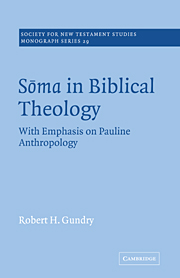Book contents
- Frontmatter
- Contents
- Acknowledgements
- Abbreviations
- PART I FOR AND AGAINST A HOLISTIC DEFINITION OF SŌMA
- PART II SŌMA IN THE FRAMEWORK OF ANTHROPOLOGICAL DUALITY
- 8 Anthropological duality and classical Greek thought
- 9 Anthropological duality in the Judaism of NT times
- 10 Anthropological duality in the NT outside Pauline literature
- 11 Anthropological duality in the OT
- 12 Anthropological duality in Pauline literature
- PART III THE THEOLOGY OF SŌMA AS PHYSICAL BODY
- Select bibliography
- Index of passages cited
- Index of authors
9 - Anthropological duality in the Judaism of NT times
Published online by Cambridge University Press: 14 January 2010
- Frontmatter
- Contents
- Acknowledgements
- Abbreviations
- PART I FOR AND AGAINST A HOLISTIC DEFINITION OF SŌMA
- PART II SŌMA IN THE FRAMEWORK OF ANTHROPOLOGICAL DUALITY
- 8 Anthropological duality and classical Greek thought
- 9 Anthropological duality in the Judaism of NT times
- 10 Anthropological duality in the NT outside Pauline literature
- 11 Anthropological duality in the OT
- 12 Anthropological duality in Pauline literature
- PART III THE THEOLOGY OF SŌMA AS PHYSICAL BODY
- Select bibliography
- Index of passages cited
- Index of authors
Summary
In moving to Jewish literature of the intertestamental and NT period, we confront an anthropological duality so clear and widespread that it can justly be described as the normative view within late Judaism. Judith says, ‘And there will not lack of his men one flesh [in the sense of body] or spirit of life’ (Jdt 10: 13). Here the individualizing use of sarx and pneuma identifies the two basic components of man. In II Mac 6: 30 pain in the body (kata to sōma) and gladness in the soul (kata psychēn) contrast. In the statement, ‘I give up body and soul’ (II Mac 7: 37), the complementary nouns sum up the whole man. So also does the statement in II Mac 14: 38 about the risking of body and soul. Judas Maccabeus is described as ‘the man who was ever in body and soul the defender of his fellow citizens’ (II Mac 15: 30). A number of passages in IV Maccabees distinguish soul and body (1: 20, 26–7, 32; 14: 6; and especially 10: 4, where it is said that men may torment the body, but not the soul; see also ch. 13 as a whole).
Jesus the son of Sirach talks of the hot psychē of a man who fornicates en sōmati sarkos autou, a possible reference to masturbation (Sir 23: 17). The Testament of Dan warns against anger, which overpowers both soul and body (3: 1–6).
- Type
- Chapter
- Information
- Soma in Biblical TheologyWith Emphasis on Pauline Anthropology, pp. 87 - 109Publisher: Cambridge University PressPrint publication year: 1976
- 1
- Cited by



